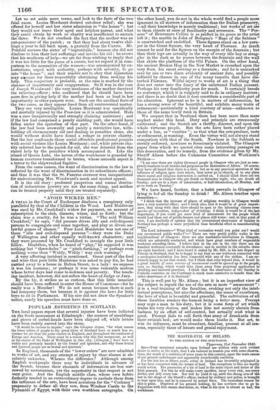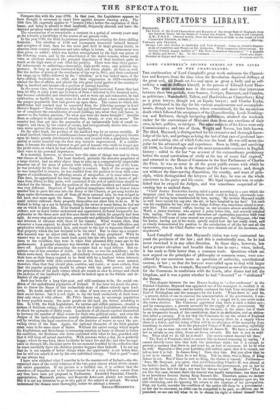THE MASTER-EVIL OF IRELAND.
TO THE EDITOR OF THE SPECTATOR.
Tipperary, 21st November 1848. Sin—Your occasional remarks upon Ireland are written with such evident desire to arrive at the truth, that I am induced to trouble you with some observe. tions, the result of a residence of some years in this country, upon the main causes of our present unfortunate and apparently irretrievable condition. For the last ten or fifteen years, crime in Ireland has invariably, originated in or has been connected with the tenure of land. The exceptions to this are hardly worth notice. The possession of a bit of land is the main object and desire of the Irish peasant. For this he will make every sacrifice, incur every risk, use every device, and defy every law. Nor will he yield it up, until the strong arm of the law in the shape of the Sheriff's officer, backed by military and police, is brought to bear upon him_ and he is removed by actual force. The immediate reason for this is plain. Deprived of his present holding, he has nowhere else to go to.
i
Expulsion with him means starvation, or, what in his eyes is almost as bad, the workhouse.
Compare this with the year 1776. In that year, the Legislature appears to have thought it necessary to enact laws against tenants running away. The 16th Geo. IIL expressly applies to " tenants (who) before the expiration of their leases, and being in arrears to their landlords, frequently abscond and leave the demised premises waste and untenanted." The examination of so remarkable a contrast in a period of seventy years may go far towards a knowledge of the source of our present evils. In the year 1793, the Irish Legislature passed the at creating the forty-shilling freeholds. The rebellion of 1798 and consequent insecurity induced farmers and occupiers of land, then for the most part held in large grazing tracts, to abandon their country residences and take refuge in towns. An inducement was thus given to sublet; which was further strengthened by the high war prices of the following years, and by the subserviency of the under-tenants, whose ready votes at elections enhanced the personal importance of their landlord, quite as much as the high rates of rent filled his pockets. There were thus three power- ftd inducements to subletting,—insecurity, high-profit rents, and political im- portance. So long as prices continued high and voters pliable, all went on well. But the decline of prices at the conclusion of the war in 181d, and their continued low range up to 1822—followed by the " rebellion," as it was looked upon, of the forty-shilling freeholders in 1826, and their suppression in 1829—materially altered the face of affairs, and placed the two great social parties of the country— that is, landlord and tenant—in a position of mutual hostility. In the mean time, the tenant population had rapidly increased. Farms that had been let fifty or sixty years ago in tracts of from a hundred to five hundred acres, had become subdivided and resubdivided; and so worn out and exhausted, by bad Cultivation, as hardly in many cases to do more than afford a bare subsistence to the pauper population that had grown up upon them. The extent to which this subdivision had reached may be conceived from the following passage in Lord Devon's Report—" Some witnesses, who had put forward most strongly as a mat- ter of complaint the consolidation of small holdings into what they call farms, in answer to the further question, 'To what size were the farms brought ? ' describe them as enlarged to the extent of twenty-five, twenty, or even ten acres." The country had thus got into the possession of an innumerable body of small oc- cupiers; and these, by the course of events, had been gradually driven into a com- mon union against the interests of their landlords. On the other hand, the position of the landlord was by no means enviable. If head landlord, whenever a middleman's lease expired, he found a property thrown upon his hands greatly deteriorated in value, and covered with a population whose partial or entire removal was the first step towards improvement. If a middle- man, it became his obvious interest to get quit of tenants who could no longer pay the profit-rents on which he had calculated, and who now refused to contribute by their votes to his personal importance.
It is material, however, to observe how this state of things was met by these two classes of landlords. The head landlord, probably the absentee proprietor of a large district, had no other object than to raise up a comparatively respectable tenantry out of the mass of poverty with which, on the falling out of the lease, he was probably for the first time brought in contact. Such of the occupiers as he was compelled to remove, he was enabled from his position to treat with some degree of consideration, by affording means of emigration, or in some other way. This done, he apportioned the land among those who remained, in farms of per- haps from fifteen to fifty acres, well contented if the evil of subdivision should be checked for the future. But the position of the smaller landlord and middleman was very different. Deprived of that political importance which in former times enabled him to push his sons into the Army or the Church, or get snug berths for them under Government,—cut off from all these external aids, he was obliged to fall back once more upon his farms. These he found occupied by persons who could neither cultivate them properly themselves nor allow him to do so. If he 'wished to bring up a son to farming, though the owner of many farms, he had not one on which to place him. If he wanted to introduce improved systems of agri- culture, now so much better understood and appreciated, he found insuperable im- pediments in the three-acre and five-acre farms into which his property had been split. At every step and at every turn, personally and politically he found his wishes and interests at variance with those of his tenants. What wonder, then, that whenever a lease expired, he should seek to relieve himself of the difficulties and perplexities which surrounded him, and resort to the law to repossess himself of that property which the law declared to be his own? But to raise up a respect- able tenantry was no object with him, as with the large proprietor. What he wanted was to get his own lands back again into his own hands, and to restore them to the condition they were in when first alienated fifty years ago by his predecessors. A partial clearance was therefore of no use to him; he must re- move all. Against this proceeding the occupier had no legal defence. But ex- pulsion was to him sentence of death. As he was, so was his neighbour; so the whole town-land, the entire parish, all similarly circumstanced, and all liable in their turn as their leases expired to be dealt with by a landlord whose interests were incompatible with their continuance on his lands. What more natural, therefore, than that they should plan, combine, and resist; or more certain, than that the popular sympathy should be always with the party ejected, and that the perpetrators of the dark crimes which are meant at once to avenge and check the exercise of the landlord's right, should be looked upon as the friends and de- fenders of the people? Such has been for a long time past, and still continues to be, the social con- dition of the agricultural population of Ireland. It has been too much the prac- tice to throw the blame of this melancholy state of affairs entirely upon land- lords. No doubt, until of late years, no class of men ever so utterly abandoned their social duties: but it is not right to lay the fault exclusively at their door; they only share it with others. Mr. Pitt's theory was, to encourage population b' every possible means. the more people on the land, the better, according to tun. In 1798, the Irish Legislature, for unwise and selfish purposes, created a system of fictitious voting; the evils of which the United Legislature did nothing to check for upwards of thirty years. Landlords of all classes exerted themselves to increase the number of these voters for their own political ends; and even the Judges of the land—themselves mostly middlemen—added indefinitely to the evil by twisting the legal construction of the doctrine of waver to meet the pre- vailing views of the time. Again, the national character of the Irish peasant must come in for some share of blame. Without the native energy which impels the Englishman and Scotchman to unceasing exertion at home or abroad to better his condition, the Irishman sits down contented with what he has, provided only that it will keep off actual starvation. With potatoes twice a day, he is perfectly happy; where he was born, there bethinks he must live and die; and thus he vege- tates on through life, his mind never for one moment troubled by the reflection that he must inevitably leave his children greater beggars than himself. I do not say that he is not capable of better things when the opportunity is set before him; but he will not search it out by his own individual energy. " God is good"—and he can always beg.
I have now sketched what I consider to be the master-evil of Ireland—the dis- organized state of the social relations of the two great classes which divide almost the entire population. If my picture is a faithful one, it is evident that the remedies—if remedies are to be found—must be of a very different nature from any that have been yet proposed in Parliament. Extended franchise, Church- appropriation, Maynooth grants, and Bequests Acts--are plainly not remedies. But it is not my intention to go to this part of the subject at present. We must understand the disease more thoroughly, before we attempt a remedy.
ANOLO-HISERNICUS.



































 Previous page
Previous page